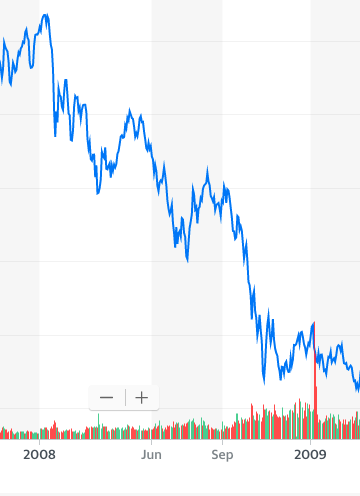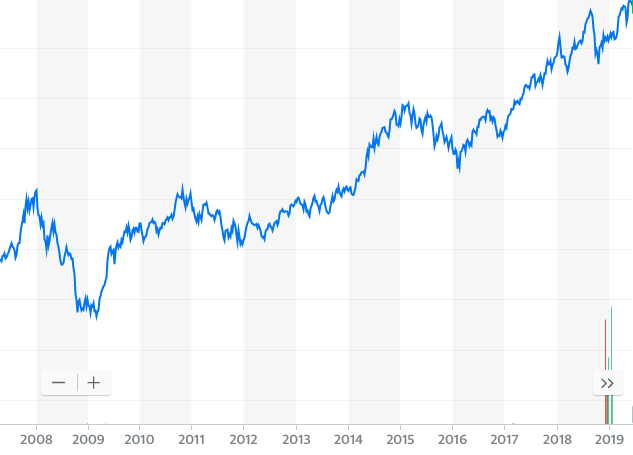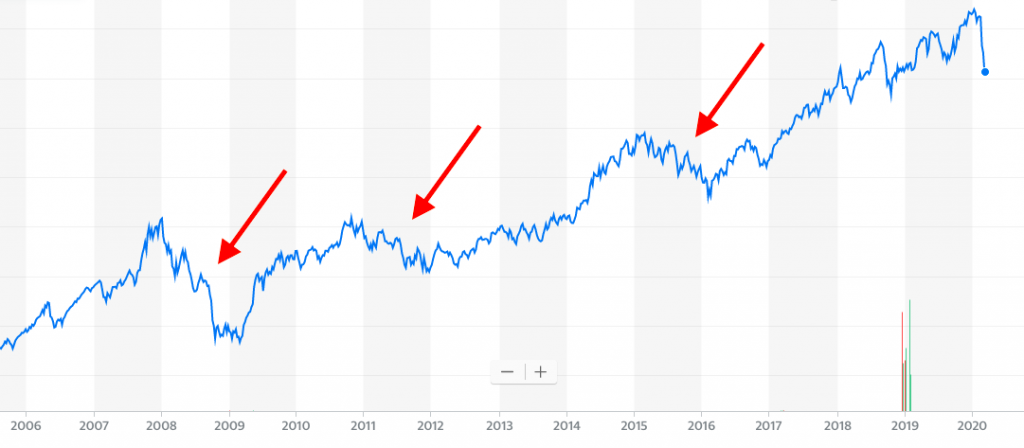Markets are Falling – What to do with My Investments?

Given the recent market crash, concerns regarding the future of your investments are valid. Should you take some action? Or keep your portfolio undisturbed? What if something else happens and the investments that you have made specifically get affected? Millions of questions, right? While I don’t guarantee you any answers, I do assure you that by the end of this article, you may get a better perspective that will help you make a decision.
Let’s begin with understanding what is causing the markets to behave erratically:
The 2020 Market Overview
For the sake of explanation, I will take the Nifty 50 Index as the benchmark of the market. On January 14, 2020, the index reached a peak and hit 12362.3. As of March 9, 2020, the index has lost around 1900+ points and corrected 15.45% from its peak.
That is a lot of correction. However, this is also in line with market corrections happening around the globe. Markets in the US, Europe, and Asia-Pacific are struggling to cope with the economic impact of Covid-19.
Investors are concerned that impact can be strong enough to drive major economies into recession and/or start the bear phase in the markets. There is an important aspect that you need to understand here:
Market Correction and Bear Phase
A market correction is a period in which stock prices fall after a period of higher prices. The idea behind a correction is that because prices rose higher than they should’ve, falling prices serve the purpose of “correcting” the situation.
It simply implies that stock prices drop from their recent peaks to continue the long-term trend. Usually, unless markets don’t decline by more than 20%, they are considered to be in a correction phase. Beyond 20% they enter the bear phase. Also, market correction lasts only for a few months.
If you turn the pages of history, you will find that every time the market has an extended rally, it enters a correction phase where stocks align with their long-term price trends.
Even if the market correction was to turn into a bear phase, the average length of a bear phase has never been longer than the bull phase which again is a sign of a healthy market.
What Should You Do With Your Investments Now?
There are two schools of thoughts running at the moment:
- Investors who think that the situation is going to get much worse for a long time and want to redeem their investments
- Investors who think that market volatility is normal and if they hold on, they can make good returns
Both these thoughts have their pros and cons. However, the important question to ask yourself is:
What were your investment objectives when you made these investments?
- Were these long-term investments targeted towards achieving a financial goal? (a)
- Were you trying to make a quick profit by timing the market and benefiting from its recent volatility? (b)
What Should Long-term Investors Do?
If the answer is (a), then I don’t see any reason to panic. Any long-term investor needs to acclimatize himself with the fact that markets will always be volatile. There will be ups and downs; rallies and crashes. However, over the long-term, markets will revive and offer good returns. Take a look at the trends.
This is what the situation was in 2008
(image credit: Yahoo Finance)
Looks scary. But look at the performance over a long period.
(image credit: Yahoo Finance)
In the long run, the same fall looks small. The markets have gained so much more. So far, whenever there has been a fall in the Indian markets, they have recovered at much higher levels. In 2011, in 2015, even back in 2000: every time it has fallen, it has come back even higher so far.
(Image credit: Yahoo Finance)
This is the nature of the markets. Never have the markets been a straight line. Keeping this in mind, let’s see a few things long term investors should pay heed to during this period.
Keep The SIPs Running
Apart from the comfort of being able to invest without having a corpus in hand, one of the biggest benefits of SIP investing is rupee cost averaging. You start a SIP knowing that the markets are volatile and hoping that they will fall by the time your next SIP date comes close so that you receive more units. Also, by the time you want to redeem, you hope that the market rallies and reaches new highs.
The table below offers a better idea of how rupee cost averaging works when the markets are down.
| Month | Investment Amount | Price Per Unit | Number of Shares Bought |
| 10th January 2019 | 10000 | 32 | 312.5 |
| 10th April 2019 | 10000 | 30 | 333.33 |
| 10th July 2019 | 10000 | 25 | 400 |
| 10th Oct, 2019 | 10000 | 23 | 434.78 |
| Total | 40000 | 27 | 1480.61 |
Currently, the markets are down. So, does it not make sense to continue your SIPs? Just a thought.
Stay Aligned with Your Long Term Objective
A long-term investor shouldn’t get worried by market corrections or even mild bear markets. If you started with an investment horizon of 7-10 years, there has never been a period in the history of stock markets around the globe that markets haven’t bounced back and offered higher returns.
Also, the fund manager is aware of what is happening in the markets and he has the experience and expertise to make the right decisions for the benefit of the portfolio. While deciding the fund strategy they factor in the possible market risks and the corrective measures they would need to take in such a situation. So stay aligned with your portfolio and don’t make hasty decisions like redeeming your funds, that can impact your long term goals, without making a proper analysis of the situation.
Diversify
It Is in times like these that a diversified portfolio comes to your rescue. If you have equity focussed portfolio you can balance it out by adding debt funds and liquid funds to the mix. You can put a small amount of money in gold investment too as it generally goes up whenever share markets go down -this will reduce your overall risk.
Focus On The Fundamentals
If you are a stock investor, who has invested in a company based on strong fundamentals and growth potential, then hold on to your existing investments. If you feel the fundamentals of the stock hasn’t changed, you can more stocks of the company in a deferred way instead of selling your existing stocks, just to buy them at a lower price. Watch this video to learn more.
What Should Short-Term Investors Do?
This can be a little tricky. Usually, short-term investors focus only on the price of the stock and not the fundamentals of the company. As a short-term investor, you can start reviewing your stocks and mutual fund holdings and check if your investments can weather this storm. If yes, then you might want to consider extending your investment horizon to a longer-term.
Summing Up
Successful investors are good decision-makers, and decision making requires you to be patient and pragmatic. With so much noise in the market and panic all around, it is natural to feel a little overwhelmed and second guess your decision of holding on to your investments.
However, it is also important that you remember what the initial objective of your portfolio was. If you have doubts, go back to the drawing board, reassess your portfolio, financial situation, risk tolerance and then make a decision.
Follow credible content sources to keep yourself abreast of what is happening, work with numbers and data, and avoid blindly following the market sentiment.
Hope this helps. Good Luck!.
Disclaimer: The views expressed in this post are that of the author and not those of Groww


